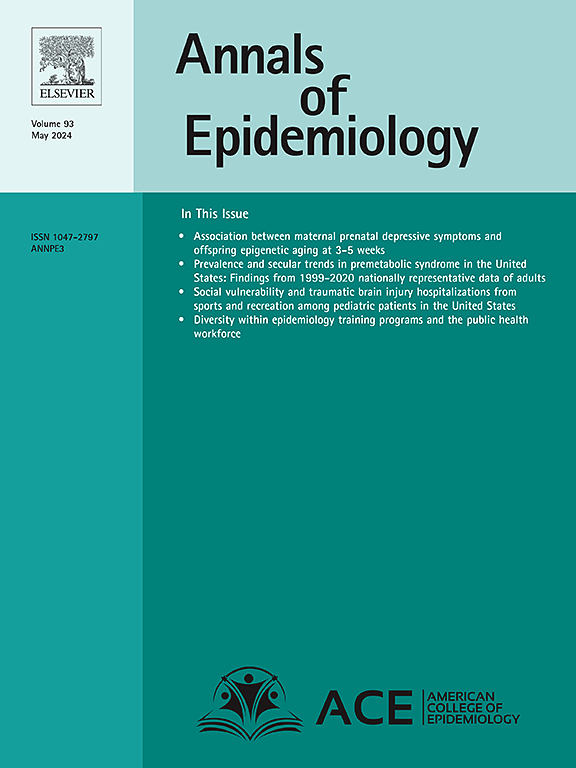School environment and adolescent health: Results from the HPTN 068 cohort
IF 3.3
3区 医学
Q1 PUBLIC, ENVIRONMENTAL & OCCUPATIONAL HEALTH
引用次数: 0
Abstract
Purpose
To assess the relationship between school environment and health and behavior outcomes.
Methods
Data are from baseline and first follow-up of the HIV Prevention Trials Network (HPTN) 068 longitudinal trial established in 2012 of adolescent girls and young women in rural Mpumalanga Province, South Africa. Data from 2212 participants are included. We measured the association between four school environment domains: school resources, school safety, negative personal experiences, and school connectedness, and several health and behavior outcomes: depressive symptoms, low attendance, recent pregnancy, recent unprotected sex, transactional sex, and having an older romantic partner. We used a g-computation approach to estimate risk differences (RD) for the longitudinal relationship between the school environment (measured at the individual and school level) on individual health and behavior outcomes, controlling for baseline covariates.
Results
The mean age of participants at baseline was 15.4; mean age at first follow-up was 16.6. Individual baseline perceptions of an unsafe school environment (RD = 3.1 %, 95 % CI: 1.3–5.2 %) and more frequent negative experiences (RD = 4.0 %, 95 % CI: 2.0–5.9 %) were associated with higher absolute risk of depressive symptoms at follow-up. There was an overall trend toward higher risk of pregnancy, unprotected sex, and having an older partner among those who reported fewer school resources, lack of school safety, more negative personal experiences, and lack of school connectedness.
Conclusions
Our findings provide evidence of an overall trend toward higher risk of depression, pregnancy, unprotected sex, and having an older partner among those reporting a worse school environment across four school environment domains.
学校环境与青少年健康:HPTN 068 队列的结果。
目的:评估学校环境与健康和行为结果之间的关系:数据来自 2012 年针对南非姆普马兰加省农村地区少女和年轻女性开展的 HIV 预防试验网络 (HPTN) 068 纵向试验的基线和首次随访。该试验纳入了 2,212 名参与者的数据。我们测量了四个学校环境领域(学校资源、学校安全、个人负面经历和学校联系)与几种健康和行为结果(抑郁症状、出勤率低、近期怀孕、近期无保护性行为、性交易和有年长的恋爱伴侣)之间的关联。在控制基线协变量的情况下,我们使用 g 计算方法估计了学校环境(在个人和学校层面测量)与个人健康和行为结果之间纵向关系的风险差异(RD):基线参与者的平均年龄为 15.4 岁;首次随访时的平均年龄为 16.6 岁。个人对学校环境不安全的基线认知(RD = 3.1%,95% CI:1.3% - 5.2%)和更频繁的负面经历(RD = 4.0%,95% CI:2.0% - 5.9%)与随访时较高的抑郁症状绝对风险有关。在那些报告了较少学校资源、缺乏学校安全、较多负面个人经历和缺乏学校联系的学生中,怀孕、无保护性行为和有较年长伴侣的风险总体呈上升趋势:我们的研究结果证明,在四个学校环境领域中,那些报告学校环境较差的学生患抑郁症、怀孕、发生无保护性行为和有年长伴侣的风险总体呈上升趋势。
本文章由计算机程序翻译,如有差异,请以英文原文为准。
求助全文
约1分钟内获得全文
求助全文
来源期刊

Annals of Epidemiology
医学-公共卫生、环境卫生与职业卫生
CiteScore
7.40
自引率
1.80%
发文量
207
审稿时长
59 days
期刊介绍:
The journal emphasizes the application of epidemiologic methods to issues that affect the distribution and determinants of human illness in diverse contexts. Its primary focus is on chronic and acute conditions of diverse etiologies and of major importance to clinical medicine, public health, and health care delivery.
 求助内容:
求助内容: 应助结果提醒方式:
应助结果提醒方式:


